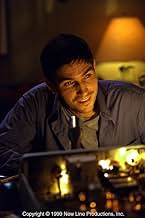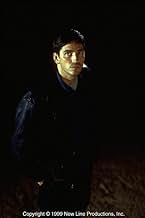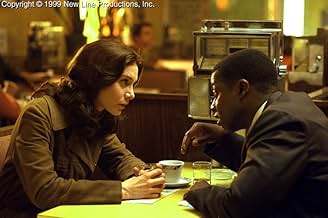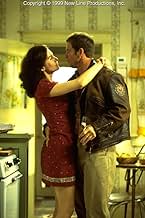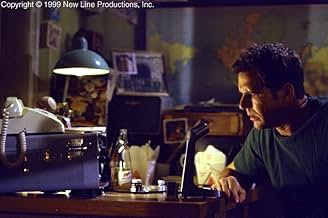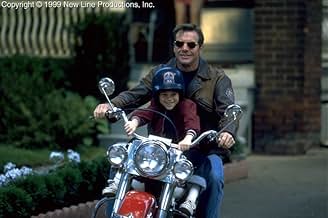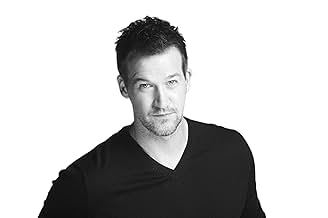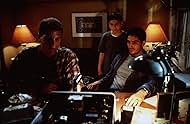Eine versehentliche Funkverbindung verbindet Vater und Sohn über 30 Jahre hinweg. Der Sohn versucht, das Leben seines Vaters zu retten, muss dann aber die Konsequenzen korrigieren.Eine versehentliche Funkverbindung verbindet Vater und Sohn über 30 Jahre hinweg. Der Sohn versucht, das Leben seines Vaters zu retten, muss dann aber die Konsequenzen korrigieren.Eine versehentliche Funkverbindung verbindet Vater und Sohn über 30 Jahre hinweg. Der Sohn versucht, das Leben seines Vaters zu retten, muss dann aber die Konsequenzen korrigieren.
- Auszeichnungen
- 2 Gewinne & 8 Nominierungen insgesamt
Empfohlene Bewertungen
This unique and interesting film is actually more of a suspense thriller than a science fiction, although I think fans of both genres will be pleased.
Dennis Quaid plays a heroic firefighter who was killed trying to rescue a runaway from a burning warehouse during the days of the Amazing Mets' World Series victory in October 1969. Jim Caviezel ("The Thin Red Line") plays his son, now a cop, thirty years later. Through some quirk of physics involving abnormal solar activity and the Aurora Borealis, the two make contact with each other across the 30-year span over a ham radio. The son is able to prevent his father's death, but changing the past also turns out to have unexpected consequences with which the two must deal.
The film really works on all levels with good action sequences and suspense, a nice dose of humor and some very touching exchanges between father and son. It explores the "what if" scenario of one's being presented with the opportunity to change an event in the past and the way in which those affected must deal with the consequences in a very intelligent and thought-provoking manner.
The acting is uniformly strong, with Quaid very appealing as the courageous firefighter and loving father who has an almost-childlike love for baseball (he even pulls off a Brooklyn accent nicely!); Caviezel is equally good as the present day version of Quaid's character's son. Caviezel brings a subtle sadness to the character, a quality one might expect from someone whose life hasn't quite worked out quite as well as it might have, possibly due to a void created by the absence of his father. One of the strongest aspects of Caviezel's performance was a subtle shift in personality following the changing of events in the past (a change which left him with memories both of his father's death and of time spent with his father in the intervening years).
I have a good feeling about this film and think it has a chance to be a real surprise hit. It's certainly one of the best films of the year thus far.
Dennis Quaid plays a heroic firefighter who was killed trying to rescue a runaway from a burning warehouse during the days of the Amazing Mets' World Series victory in October 1969. Jim Caviezel ("The Thin Red Line") plays his son, now a cop, thirty years later. Through some quirk of physics involving abnormal solar activity and the Aurora Borealis, the two make contact with each other across the 30-year span over a ham radio. The son is able to prevent his father's death, but changing the past also turns out to have unexpected consequences with which the two must deal.
The film really works on all levels with good action sequences and suspense, a nice dose of humor and some very touching exchanges between father and son. It explores the "what if" scenario of one's being presented with the opportunity to change an event in the past and the way in which those affected must deal with the consequences in a very intelligent and thought-provoking manner.
The acting is uniformly strong, with Quaid very appealing as the courageous firefighter and loving father who has an almost-childlike love for baseball (he even pulls off a Brooklyn accent nicely!); Caviezel is equally good as the present day version of Quaid's character's son. Caviezel brings a subtle sadness to the character, a quality one might expect from someone whose life hasn't quite worked out quite as well as it might have, possibly due to a void created by the absence of his father. One of the strongest aspects of Caviezel's performance was a subtle shift in personality following the changing of events in the past (a change which left him with memories both of his father's death and of time spent with his father in the intervening years).
I have a good feeling about this film and think it has a chance to be a real surprise hit. It's certainly one of the best films of the year thus far.
10Tabby-6
Changing the past to affect the future may not be a new concept in film, but "Frequency" handles it deftly and with heart. The acting is superb, and as far as I can tell the plot is nearly airtight. It keeps you on your toes as the story twists in what feels like six directions at once and keeps you in emotional sync with the characters. The past/present connections are stirring and intriguing, especially the single-flash cuts at pivotal moments. This is one of the few movies about which I can honestly say, "I laughed, I cried, I was scared stupid." Truly the only good movie so far this year.
The movie opens with the introduction of the Sullivan family. Frank (Dennis Quaid) is a heroic New York firefighter, and escapes a harrowing situation to return home to his wife and his 6-year-old son John. It's an exciting time in New York, as the 'Miracle Mets' have made the World Series. Frank is a ham radio user, and a strange disturbance in the sky (solar flares, I believe. I never took astronomy) in the sky has really increased the range of his radio. "I'm reaching people I've never reached before", he says. Flash forward to 1999, when young John has grown up into a 36-year-old NY homicide detective (James Caviezel) with relational problems (and possibly a drinking problem as well). We learn his father died several years earlier in a warehouse fire, and it's obvious that John has never really gotten over it. He ends up setting up the old ham radio (did I mention that the solar flares are back?), and contacts a fellow New Yorker named Frank. It certainly won't ruin any big surprise when I tell you that it's his father Frank--in 1969. After recovering from his astonishment and convincing his father who he really is (his knowledge of the 1969 World Series proves quite helpful), they begin a series of nightly conversations. Unfortunately, their conversations change the past--and the future--in very dangerous ways. A serial killer who should only have 3 victims suddenly has more, and John must use his knowledge of the crimes (30 years old to him) to guide his dad in a 1969 pursuit of the killer. And the chase is on. Will they stop the killer? Will the solar flares last long enough for them to finish their plan? Will anyone in 1999 or 1969 believe them? That lengthy 'plot summary' really didn't ruin any of the suspense--or come close to explaining the whole story. So, it goes without saying that the story is pretty convoluted and involved. But it's not hard to follow, and the movie grabbed me and kept me interested throughout. Granted, you will need to use a serious amount of 'suspension of disbelief'. If you get hung up on "there's no way they could be talking to each other" or "changes in the past wouldn't immediately appear in the future--they would have already happened and would have been there all along", you'll do 2 things: (1) you'll give yourself a headache, and (2) you'll miss out on a very entertaining film. The reason I gave this more stars than last week's "U-571"? I cared about the characters, and I found "Frequency" much more entertaining. Also, the story was quite original--with great use of the Miracle Mets and the 1969 World Series throughout.
An excellent movie, what a pleasant surprise. I can't remember the last time I was in a movie where the audience applauded at the end, and at scenes during the movie, too. It could be called a thriller, but that's just a part of what the movie was about. It was filled with well placed sentimentality and timely humor. Not a moment in the movie was there a wasted scene or a time when I lost interest. Yes, a Hollywood ending, but like most good things, it's the journey not the destination that makes it worth while. I saw it at a sneak preview, and I will go see it again in general release. I highly recommend it. It's not an epic, but it is the best movie I've seen in years.
FREQUENCY / (2000) ***1/2
It' 1999. Jim Caviezel stars as John Sullivan, a detective whose life is falling apart. Recently, he has split up from his girlfriend, he and his police partner Satch (Andre Braugher), are unable to solve a serial murder case that has been reopened due to the discovery of skeletal remains of a past victim. The thirty year anniversary of the death of his firefighter father (Dennis Quaid), is also approaching. John is beginning to sink in a pit of despair.
One night John stumbles upon his dad's old ham radio. He makes an effort to get the machine to power up once again. When he does and begins conversations with another operator, however, he realizes the person he is communicating with is his long dead father. Somehow, due to the presence of the Northern Lights, John is able to transmit back in time to 1969 and literally alter the course of his existence.
The concept of time traveling communication may seem far-fetched to some, and "Frequency" is a little hard to grasp at times, especially when the film never directly explains why the father and son are able to talk with each other through time. Notwithstanding, the production works as a science fiction thriller with supernatural overtones. While the filmmakers do succeed in convincingly constructing "Frequency," most audiences might have to leave logic at the theater entrance before viewing it.
"Frequency" is a well-structured motion picture; the movie is focused throughout. Although its story changes pace at different periods, for the most part the audience can follow along with the characters. This is a movie with a complicated and challenging story. Because of the film's complexity, we are enormously involved, if slightly confused. Screenwriter Tobias Emmerich links original and fresh feeling material here. Gregory Hoblit produces the right amount of action and suspense, combined with gentle emotions, to generate a film we have not seen before.
Dennis Quaid and James Caviezel are the perfect choices for the principal characters. Quaid performs with intriguing tension and appropriate receptivity. Caviezel dazzles with intricacy and dexterity. Offering refined supporting roles are Andre Braugher ("City of Angels", "Get on the Bus") and Noah Emmerich ("The Truman Show") who furnishes some light-hearted material as John's best friend.
Director Gregory Hoblit ("Fallen," "Primal Fear") clearly executes topics on screen. This film is overflowing with ideas and contains enough plot for a television series. However, "Frequency" is not without flaws. Sullivan's chaotic life is only vaguely portrayed. Although we do care for the character, more development would increase the relationship between the audience and he. Some of the make-up effects depicting age differences were disgraceful. Andre Braugher appeared as if his make up artists were straight out of junior high, slapping too much pancake cream plaster on him. The film's contrived climax concludes with a formalistic fight instead of continuing its battle of wits.
Despite a few unacceptable external problems, internally this is a very effective production. As a whole, "Frequency" contains a very encompassing story and places interesting characters in engaging circumstances. The movie is definitely worthy of recognition, but do not view it unless you plan on thoroughly discussing it afterwards.
It' 1999. Jim Caviezel stars as John Sullivan, a detective whose life is falling apart. Recently, he has split up from his girlfriend, he and his police partner Satch (Andre Braugher), are unable to solve a serial murder case that has been reopened due to the discovery of skeletal remains of a past victim. The thirty year anniversary of the death of his firefighter father (Dennis Quaid), is also approaching. John is beginning to sink in a pit of despair.
One night John stumbles upon his dad's old ham radio. He makes an effort to get the machine to power up once again. When he does and begins conversations with another operator, however, he realizes the person he is communicating with is his long dead father. Somehow, due to the presence of the Northern Lights, John is able to transmit back in time to 1969 and literally alter the course of his existence.
The concept of time traveling communication may seem far-fetched to some, and "Frequency" is a little hard to grasp at times, especially when the film never directly explains why the father and son are able to talk with each other through time. Notwithstanding, the production works as a science fiction thriller with supernatural overtones. While the filmmakers do succeed in convincingly constructing "Frequency," most audiences might have to leave logic at the theater entrance before viewing it.
"Frequency" is a well-structured motion picture; the movie is focused throughout. Although its story changes pace at different periods, for the most part the audience can follow along with the characters. This is a movie with a complicated and challenging story. Because of the film's complexity, we are enormously involved, if slightly confused. Screenwriter Tobias Emmerich links original and fresh feeling material here. Gregory Hoblit produces the right amount of action and suspense, combined with gentle emotions, to generate a film we have not seen before.
Dennis Quaid and James Caviezel are the perfect choices for the principal characters. Quaid performs with intriguing tension and appropriate receptivity. Caviezel dazzles with intricacy and dexterity. Offering refined supporting roles are Andre Braugher ("City of Angels", "Get on the Bus") and Noah Emmerich ("The Truman Show") who furnishes some light-hearted material as John's best friend.
Director Gregory Hoblit ("Fallen," "Primal Fear") clearly executes topics on screen. This film is overflowing with ideas and contains enough plot for a television series. However, "Frequency" is not without flaws. Sullivan's chaotic life is only vaguely portrayed. Although we do care for the character, more development would increase the relationship between the audience and he. Some of the make-up effects depicting age differences were disgraceful. Andre Braugher appeared as if his make up artists were straight out of junior high, slapping too much pancake cream plaster on him. The film's contrived climax concludes with a formalistic fight instead of continuing its battle of wits.
Despite a few unacceptable external problems, internally this is a very effective production. As a whole, "Frequency" contains a very encompassing story and places interesting characters in engaging circumstances. The movie is definitely worthy of recognition, but do not view it unless you plan on thoroughly discussing it afterwards.
Wusstest du schon
- WissenswertesIn the warehouse fire scene, all the firefighters except Dennis Quaid, Peter MacNeill and Jordan Bridges are real.
- Patzer(at around 5 mins) In the 1969 segment, there is a glance of a record collection where you can clearly see the "Elvis Presley In Concert" double album, which was released in 1977.
- SoundtracksCrimson and Clover
Written by Tommy James (as Thomas Gregory Jackson) and Peter P. Lucia Jr.
Performed by Tommy James and Tommy James & The Shondells
Courtesy of Rhino Entertainment Co.
By Arrangement with Warner Special Products
Top-Auswahl
Melde dich zum Bewerten an und greife auf die Watchlist für personalisierte Empfehlungen zu.
- How long is Frequency?Powered by Alexa
Details
- Erscheinungsdatum
- Herkunftsland
- Offizieller Standort
- Sprache
- Auch bekannt als
- Desafio al tiempo
- Drehorte
- Produktionsfirma
- Weitere beteiligte Unternehmen bei IMDbPro anzeigen
Box Office
- Budget
- 31.000.000 $ (geschätzt)
- Bruttoertrag in den USA und Kanada
- 45.010.278 $
- Eröffnungswochenende in den USA und in Kanada
- 9.025.584 $
- 30. Apr. 2000
- Weltweiter Bruttoertrag
- 68.106.245 $
- Laufzeit1 Stunde 58 Minuten
- Farbe
- Sound-Mix
- Seitenverhältnis
- 2.35 : 1
Zu dieser Seite beitragen
Bearbeitung vorschlagen oder fehlenden Inhalt hinzufügen



